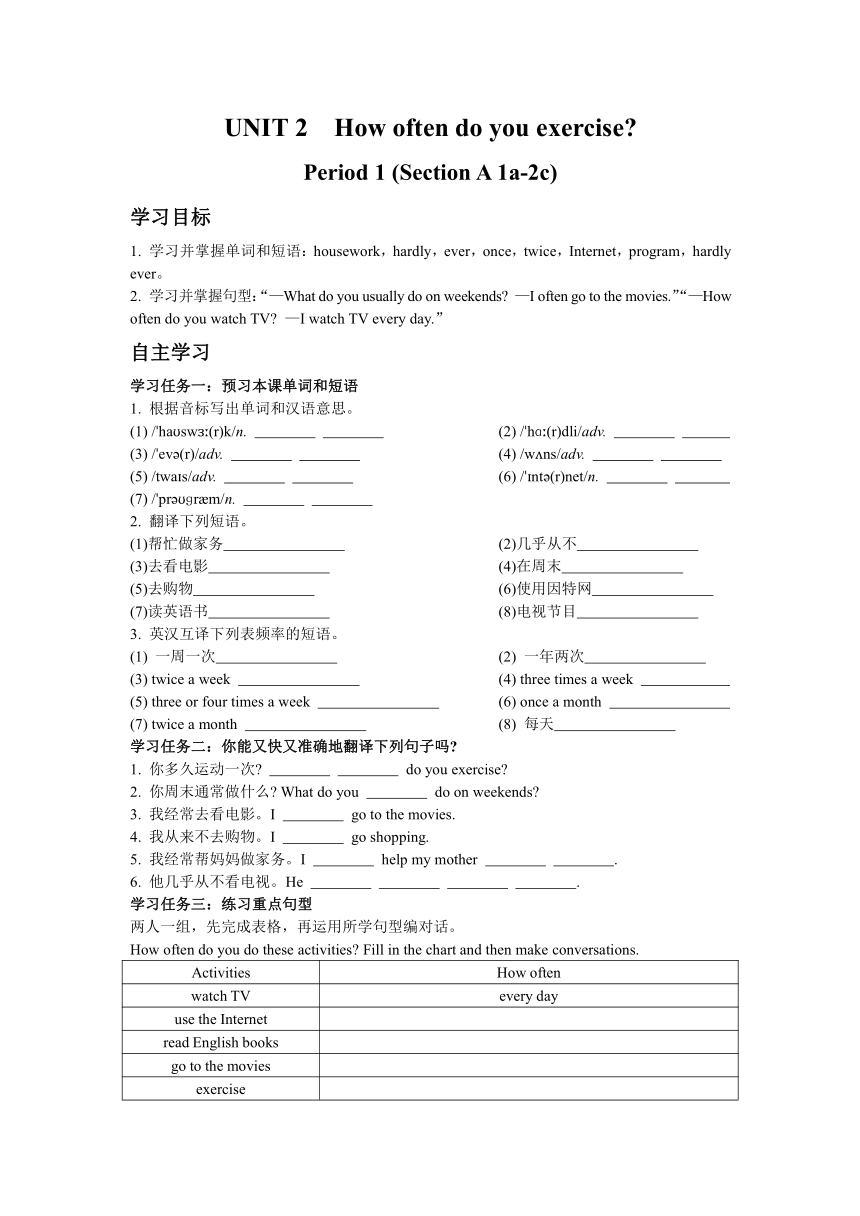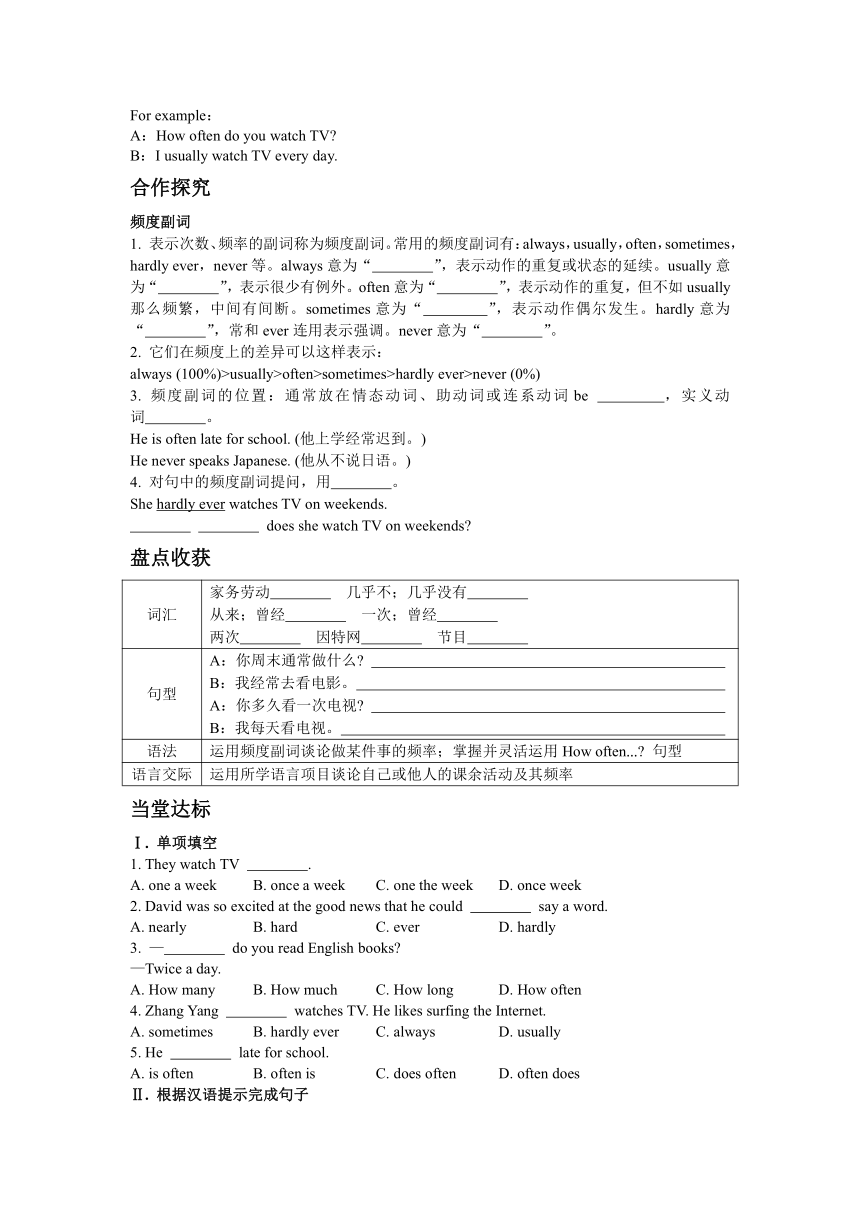Unit 2 How often do you exercise? Period 1(Section A 1a-2c)学案(无答案)
文档属性
| 名称 | Unit 2 How often do you exercise? Period 1(Section A 1a-2c)学案(无答案) |  | |
| 格式 | docx | ||
| 文件大小 | 20.5KB | ||
| 资源类型 | 教案 | ||
| 版本资源 | 人教新目标(Go for it)版 | ||
| 科目 | 英语 | ||
| 更新时间 | 2023-08-15 17:24:10 | ||
图片预览


文档简介
UNIT 2 How often do you exercise
Period 1 (Section A 1a-2c)
学习目标
1. 学习并掌握单词和短语:housework,hardly,ever,once,twice,Internet,program,hardly ever。
2. 学习并掌握句型:“—What do you usually do on weekends —I often go to the movies.”“—How often do you watch TV —I watch TV every day.”
自主学习
学习任务一:预习本课单词和短语
1. 根据音标写出单词和汉语意思。
(1) / ha sw (r)k/n. (2) / hɑ (r)dli/adv.
(3) / ev (r)/adv. (4) /w ns/adv.
(5) /twa s/adv. (6) / nt (r)net/n.
(7) / pr ɡr m/n.
2. 翻译下列短语。
(1)帮忙做家务 (2)几乎从不
(3)去看电影 (4)在周末
(5)去购物 (6)使用因特网
(7)读英语书 (8)电视节目
3. 英汉互译下列表频率的短语。
(1) 一周一次 (2) 一年两次
(3) twice a week (4) three times a week
(5) three or four times a week (6) once a month
(7) twice a month (8) 每天
学习任务二:你能又快又准确地翻译下列句子吗
1. 你多久运动一次 do you exercise
2. 你周末通常做什么 What do you do on weekends
3. 我经常去看电影。I go to the movies.
4. 我从来不去购物。I go shopping.
5. 我经常帮妈妈做家务。I help my mother .
6. 他几乎从不看电视。He .
学习任务三:练习重点句型
两人一组,先完成表格,再运用所学句型编对话。
How often do you do these activities Fill in the chart and then make conversations.
Activities How often
watch TV every day
use the Internet
read English books
go to the movies
exercise
For example:
A:How often do you watch TV
B:I usually watch TV every day.
合作探究
频度副词
1. 表示次数、频率的副词称为频度副词。常用的频度副词有:always,usually,often,sometimes,hardly ever,never等。always意为“ ”,表示动作的重复或状态的延续。usually意为“ ”,表示很少有例外。often意为“ ”,表示动作的重复,但不如usually那么频繁,中间有间断。sometimes意为“ ”,表示动作偶尔发生。hardly意为“ ”,常和ever连用表示强调。never意为“ ”。
2. 它们在频度上的差异可以这样表示:
always (100%)>usually>often>sometimes>hardly ever>never (0%)
3. 频度副词的位置:通常放在情态动词、助动词或连系动词be ,实义动词 。
He is often late for school. (他上学经常迟到。)
He never speaks Japanese. (他从不说日语。)
4. 对句中的频度副词提问,用 。
She hardly ever watches TV on weekends.
does she watch TV on weekends
盘点收获
词汇 家务劳动 几乎不;几乎没有 从来;曾经 一次;曾经 两次 因特网 节目
句型 A:你周末通常做什么 B:我经常去看电影。 A:你多久看一次电视 B:我每天看电视。
语法 运用频度副词谈论做某件事的频率;掌握并灵活运用How often... 句型
语言交际 运用所学语言项目谈论自己或他人的课余活动及其频率
当堂达标
Ⅰ. 单项填空
1. They watch TV .
A. one a week B. once a week C. one the week D. once week
2. David was so excited at the good news that he could say a word.
A. nearly B. hard C. ever D. hardly
3. — do you read English books
—Twice a day.
A. How many B. How much C. How long D. How often
4. Zhang Yang watches TV. He likes surfing the Internet.
A. sometimes B. hardly ever C. always D. usually
5. He late for school.
A. is often B. often is C. does often D. often does
Ⅱ. 根据汉语提示完成句子
1. My (最喜欢的节目) is Animal World.
2. Please speak louder. I can (几乎不) hear you.
3. Some students watch TV (两次) a week.
4. My mother often (去购物) on Sunday.
5. Jim is a good boy. He often (帮忙做家务).
Ⅲ. 选词填空
1. (how often/how far/how long)
①— do you go fishing
—Every day.
② is it from your home to school
③ does it take you to finish your homework
2. (use/with)
①May I your pen Mine is lost.
②She wrote the letter a pencil.
3. (sometimes/sometime/some times/some time)
①I will stay here for .
②Tom went back home last month.
③I met him in the street last month.
④ I come by train,but usually I come by car.
Ⅳ. 阅读理解
Everyone knows that exercise is important. We all need to exercise. Doctors say it is good for us. It makes your heart and body strong. Children who often exercise are smarter. This means they do better in tests and schoolwork than those who don’t exercise.
There are many ways to exercise. You can walk,run,swim,skate or play ball games. Make sure you exercise in the following ways:you have to like what you are doing;exercise enough but not too much. It’s best to exercise twice a week. Thirty minutes each time is enough. Try all kinds of things until you find one,two or even three sports that are right for you.
You can exercise at fitness centers. They have a lot of equipment (设备) there. The equipment will help exercise your arms,legs,and other parts of your body to make you fit. Some people buy equipment for their homes. But it is very expensive.
Exercising can be fun. Friends can exercise together at a fitness center. Or they can play sports together. How do you exercise
1. In the passage,the writer tells us that we all need to .
A. drink B. sleep C. exercise D. work
2. Which of the following sports is NOT mentioned in the passage
A. Fishing. B. Running. C. Swimming. D. Walking.
3. How many times should we exercise each week according to the passage
A. Once. B. Twice. C. Three times. D. Four times.
4. The words “fitness centers” in the passage mean .
A. 商务中心 B. 健身中心 C. 购物中心 D. 医疗中心
5. The equipment in fitness centers will help exercise our .
A. arms B. legs
C. other parts of the body D. A,B and C
学后反思
_____________________________________________________________________________________________________________________________________________________________________________________________________________________________________________
当堂达标参考答案与解析:
Ⅰ. 1. B once a week为固定短语,意为“一周一次”。
2. D nearly“几乎”;hard“努力地;坚硬的”;ever“曾经”;hardly“几乎不”。本句是一个so...that...句型,由主句句意“戴维对这个好消息感到如此激动”可知,从句句意为“以至于他几乎说不出话来”,因此选D。
3. D how many提问可数名词的数量;how much提问不可数名词的量或物品的价格;how long提问一段时间或物体的长度;提问“频率”用how often。由答句“一天两次”可知询问频率,故选D。
4. B 由后句句意“他喜欢网上冲浪”可推知“张阳几乎从不看电视”,故选B。
5. A be late for意为“迟到”;频度副词常放在连系动词be之后,故选A。
Ⅱ. 1. favorite program
2. hardly hardly意为“几乎不”。句意为“请大声点儿说,我几乎听不见你的话”。
3. twice twice a week意为“一周两次”。
4. goes shopping go shopping意为“去购物”。由often可知该句为一般现在时;主语my mother为第三人称单数,故谓语动词也应用第三人称单数形式,go的第三人称单数形式为goes。
5. helps with housework help with housework意为“帮忙做家务”,该句为一般现在时,主语he为第三人称单数,因此谓语动词用第三人称单数形式,help的第三人称单数形式为helps。
Ⅲ. 1. ①How often ②How far ③How long
2. ①use ②with
3. ①some time ②sometime ③some times ④Sometimes
Ⅳ. 1~5 CABBD
Period 1 (Section A 1a-2c)
学习目标
1. 学习并掌握单词和短语:housework,hardly,ever,once,twice,Internet,program,hardly ever。
2. 学习并掌握句型:“—What do you usually do on weekends —I often go to the movies.”“—How often do you watch TV —I watch TV every day.”
自主学习
学习任务一:预习本课单词和短语
1. 根据音标写出单词和汉语意思。
(1) / ha sw (r)k/n. (2) / hɑ (r)dli/adv.
(3) / ev (r)/adv. (4) /w ns/adv.
(5) /twa s/adv. (6) / nt (r)net/n.
(7) / pr ɡr m/n.
2. 翻译下列短语。
(1)帮忙做家务 (2)几乎从不
(3)去看电影 (4)在周末
(5)去购物 (6)使用因特网
(7)读英语书 (8)电视节目
3. 英汉互译下列表频率的短语。
(1) 一周一次 (2) 一年两次
(3) twice a week (4) three times a week
(5) three or four times a week (6) once a month
(7) twice a month (8) 每天
学习任务二:你能又快又准确地翻译下列句子吗
1. 你多久运动一次 do you exercise
2. 你周末通常做什么 What do you do on weekends
3. 我经常去看电影。I go to the movies.
4. 我从来不去购物。I go shopping.
5. 我经常帮妈妈做家务。I help my mother .
6. 他几乎从不看电视。He .
学习任务三:练习重点句型
两人一组,先完成表格,再运用所学句型编对话。
How often do you do these activities Fill in the chart and then make conversations.
Activities How often
watch TV every day
use the Internet
read English books
go to the movies
exercise
For example:
A:How often do you watch TV
B:I usually watch TV every day.
合作探究
频度副词
1. 表示次数、频率的副词称为频度副词。常用的频度副词有:always,usually,often,sometimes,hardly ever,never等。always意为“ ”,表示动作的重复或状态的延续。usually意为“ ”,表示很少有例外。often意为“ ”,表示动作的重复,但不如usually那么频繁,中间有间断。sometimes意为“ ”,表示动作偶尔发生。hardly意为“ ”,常和ever连用表示强调。never意为“ ”。
2. 它们在频度上的差异可以这样表示:
always (100%)>usually>often>sometimes>hardly ever>never (0%)
3. 频度副词的位置:通常放在情态动词、助动词或连系动词be ,实义动词 。
He is often late for school. (他上学经常迟到。)
He never speaks Japanese. (他从不说日语。)
4. 对句中的频度副词提问,用 。
She hardly ever watches TV on weekends.
does she watch TV on weekends
盘点收获
词汇 家务劳动 几乎不;几乎没有 从来;曾经 一次;曾经 两次 因特网 节目
句型 A:你周末通常做什么 B:我经常去看电影。 A:你多久看一次电视 B:我每天看电视。
语法 运用频度副词谈论做某件事的频率;掌握并灵活运用How often... 句型
语言交际 运用所学语言项目谈论自己或他人的课余活动及其频率
当堂达标
Ⅰ. 单项填空
1. They watch TV .
A. one a week B. once a week C. one the week D. once week
2. David was so excited at the good news that he could say a word.
A. nearly B. hard C. ever D. hardly
3. — do you read English books
—Twice a day.
A. How many B. How much C. How long D. How often
4. Zhang Yang watches TV. He likes surfing the Internet.
A. sometimes B. hardly ever C. always D. usually
5. He late for school.
A. is often B. often is C. does often D. often does
Ⅱ. 根据汉语提示完成句子
1. My (最喜欢的节目) is Animal World.
2. Please speak louder. I can (几乎不) hear you.
3. Some students watch TV (两次) a week.
4. My mother often (去购物) on Sunday.
5. Jim is a good boy. He often (帮忙做家务).
Ⅲ. 选词填空
1. (how often/how far/how long)
①— do you go fishing
—Every day.
② is it from your home to school
③ does it take you to finish your homework
2. (use/with)
①May I your pen Mine is lost.
②She wrote the letter a pencil.
3. (sometimes/sometime/some times/some time)
①I will stay here for .
②Tom went back home last month.
③I met him in the street last month.
④ I come by train,but usually I come by car.
Ⅳ. 阅读理解
Everyone knows that exercise is important. We all need to exercise. Doctors say it is good for us. It makes your heart and body strong. Children who often exercise are smarter. This means they do better in tests and schoolwork than those who don’t exercise.
There are many ways to exercise. You can walk,run,swim,skate or play ball games. Make sure you exercise in the following ways:you have to like what you are doing;exercise enough but not too much. It’s best to exercise twice a week. Thirty minutes each time is enough. Try all kinds of things until you find one,two or even three sports that are right for you.
You can exercise at fitness centers. They have a lot of equipment (设备) there. The equipment will help exercise your arms,legs,and other parts of your body to make you fit. Some people buy equipment for their homes. But it is very expensive.
Exercising can be fun. Friends can exercise together at a fitness center. Or they can play sports together. How do you exercise
1. In the passage,the writer tells us that we all need to .
A. drink B. sleep C. exercise D. work
2. Which of the following sports is NOT mentioned in the passage
A. Fishing. B. Running. C. Swimming. D. Walking.
3. How many times should we exercise each week according to the passage
A. Once. B. Twice. C. Three times. D. Four times.
4. The words “fitness centers” in the passage mean .
A. 商务中心 B. 健身中心 C. 购物中心 D. 医疗中心
5. The equipment in fitness centers will help exercise our .
A. arms B. legs
C. other parts of the body D. A,B and C
学后反思
_____________________________________________________________________________________________________________________________________________________________________________________________________________________________________________
当堂达标参考答案与解析:
Ⅰ. 1. B once a week为固定短语,意为“一周一次”。
2. D nearly“几乎”;hard“努力地;坚硬的”;ever“曾经”;hardly“几乎不”。本句是一个so...that...句型,由主句句意“戴维对这个好消息感到如此激动”可知,从句句意为“以至于他几乎说不出话来”,因此选D。
3. D how many提问可数名词的数量;how much提问不可数名词的量或物品的价格;how long提问一段时间或物体的长度;提问“频率”用how often。由答句“一天两次”可知询问频率,故选D。
4. B 由后句句意“他喜欢网上冲浪”可推知“张阳几乎从不看电视”,故选B。
5. A be late for意为“迟到”;频度副词常放在连系动词be之后,故选A。
Ⅱ. 1. favorite program
2. hardly hardly意为“几乎不”。句意为“请大声点儿说,我几乎听不见你的话”。
3. twice twice a week意为“一周两次”。
4. goes shopping go shopping意为“去购物”。由often可知该句为一般现在时;主语my mother为第三人称单数,故谓语动词也应用第三人称单数形式,go的第三人称单数形式为goes。
5. helps with housework help with housework意为“帮忙做家务”,该句为一般现在时,主语he为第三人称单数,因此谓语动词用第三人称单数形式,help的第三人称单数形式为helps。
Ⅲ. 1. ①How often ②How far ③How long
2. ①use ②with
3. ①some time ②sometime ③some times ④Sometimes
Ⅳ. 1~5 CABBD
同课章节目录
- Unit 1 Where did you go on vacation?
- Section A
- Section B
- Unit 2 How often do you exercise?
- Section A
- Section B
- Unit 3 I'm more outgoing than my sister.
- Section A
- Section B
- Unit 4 What's the best movie theater?
- Section A
- Section B
- Unit 5 Do you want to watch a game show?
- Section A
- Section B
- Unit 6 I'm going to study computer science.
- Section A
- Section B
- Unit 7 Will people have robots?
- Section A
- Section B
- Unit 8 How do you make a banana milk shake?
- Section A
- Section B
- Unit 9 Can you come to my party?
- Section A
- Section B
- Unit 10 If you go to the party, you'll have a grea
- Section A
- Section B
